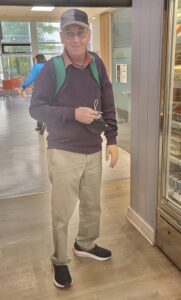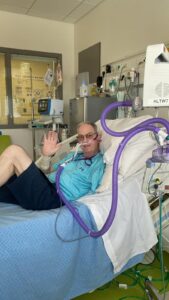John’s Story:
John loves hiking and is an avid hill walker. He’s climbed the highest peaks in Wales, Scotland and Ireland. That hobby came to an abrupt halt however, when John was diagnosed with Idiopathic pulmonary fibrosis (IPF). It was quite unexpected news, and John did not know what his future had in store.
 “I was on a campervanning trip with my wife, Breda in Easkey, County Sligo in 2020. I had a small cough at the time, but thought it was harmless. It was a sunny April day when we decided to climb the Strandhill Panhead, despite my cough. But all along the trail I was caught for breath. I had to stop several times as my breathing became more laboured. Eventually, we made it to the top and I chalked my breathlessness up to just having an ‘off’ day and didn’t think too much of it.
“I was on a campervanning trip with my wife, Breda in Easkey, County Sligo in 2020. I had a small cough at the time, but thought it was harmless. It was a sunny April day when we decided to climb the Strandhill Panhead, despite my cough. But all along the trail I was caught for breath. I had to stop several times as my breathing became more laboured. Eventually, we made it to the top and I chalked my breathlessness up to just having an ‘off’ day and didn’t think too much of it.
“Our trip ended, and Breda and I went back to our normal routines. Soon after though, my cough developed into something terrible. It just would not go away. No matter how many bottles of cough syrup I took, I could not shake it. By mid-summer, Breda urged me to see my GP, Dr. Mary. Shortly after that, I went to see a respiratory specialist. There, I underwent a variety of tests, including a Bronchoscopy, a procedure which examines the airways and lungs. It wasn’t until three days before Christmas in December 2020 that I got my test results back. The news was shocking. My respiratory specialist, Dr. Aidan told me, straight as you like, that I have Idiopathic pulmonary fibrosis (IPF). I was stuck to the ground.
“IPF is a lung disease where healthy tissue is replaced by scar tissue, causing the lungs to become stiff, making it hard to breathe. There are two things about this disease that make it all the more challenging. First, idiopathic means the cause of the lung disease is unknown. And secondly, to date, there is no known cure. Dr. Aidan informed me I had around three to five years to live. He reckoned for my diagnosis; I’d be closer to the three-year mark. I thought at first, Dr. Aidan was joking, but he wasn’t.
“That diagnosis wasn’t what I was expecting at all. I left the doctor’s office numb. News like that doesn’t sink in straight away, so I went back to work that same day.
“Almost two years after that, I reached a stage where I could not breathe on my own. I needed to use oxygen, and I had stopped working. I did not have a choice; my body could not handle it. I was exhausted.
“A lung transplant was my only hope. I took the tests to see if I was eligible for a lung transplant and it turned out, I was. My name was added to the transplant list in early 2023. I had a shot at living a bit longer. 
“Unfortunately, my health took a downward trend shortly thereafter. By May of 2023, I was using two oxygen machines at home, but that was not enough. The only option I had was to be admitted to the Heart and Lung Transplant Unit in the Mater Hospital. I spent the entire summer there.
“A new treatment became available to me while I was in hospital. The Mater Foundation funded something called Vapotherm high velocity therapy. It is a type of respiratory support that provides heated and humidified oxygen. It made using oxygen more comfortable for me.
“During my long stay, my need for oxygen gradually increased. Eventually, I hit the maximum amount of oxygen the machine could pump out. The oxygen machine was keeping me alive. My lungs were gone.
“One Thursday, in August 2023, I was given sad news. My medical team told me, ‘John, we don’t think you’re going to live past the weekend.’ My wife Breda and niece Ailise took the train up from County Clare to see me and talk with my doctors.
“The Palliative Care team had me well prepared for this event. I thought, ‘If it’s going to be that way, it’s going to be that way. There’s nothing we can do about it.’
“My fate changed just two days later. On Saturday that week, my Transplant Coordinator Ms. Maria came to see me. As the clock struck midnight, she told me a lung had become available! At 5 am on Sunday morning, I was wheeled into the operating room.
“Hours later, I woke up. For the first time in a year, there was no oxygen going up my nose. I could breathe on my own again. It was an incredible feeling.
“The Physiotherapists Olive and Patricia got me moving right away. They were brilliant during my recovery. I was able to walk without the need for oxygen. Without being tied to a machine. I could pedal on the exercise bikes with my own breath. I was free.
“Without the incredible transplant team in the Mater Misericordiae University Hospital, I would not be alive today. Without my donor, I would not have a second chance at life. I am immensely grateful.
“Something as seemingly harmless as a simple cough changed my life forever. What I thought was just a cold turned out to be a devastating diagnosis for me and my family. The path ahead of me was rocky, but I forged on with the help of the Mater team, my family and my donor. I didn’t know if I would make it, but I had nothing to lose. Now, every breath I take is a reminder: I made it. I hiked the hardest trek of my life, and I made it.
“Many, many thanks to everyone.
Regards,
John McMahon



